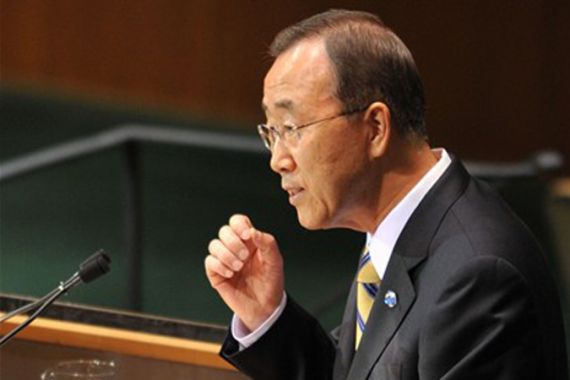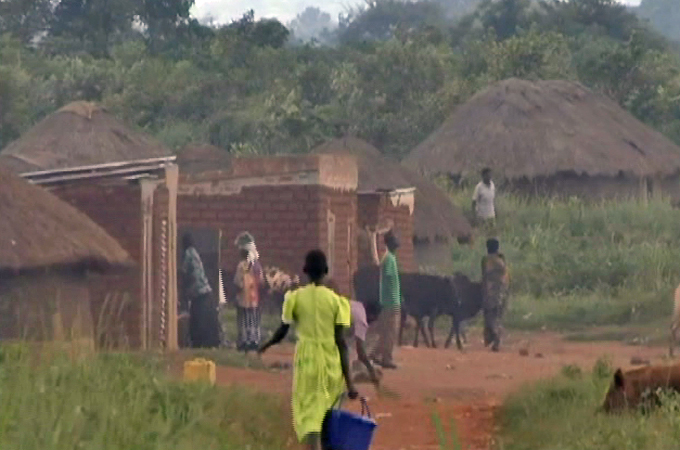Plea to refocus UN millennium goals
Despite little progress, world leaders meet in the US with a commitment to reach development goals on reducing poverty.

 |
| Amnesty International estimates that 70 per cent of those living in poverty are women [Al Jazeera] |
Ban Ki-moon, the UN secretary-general, has opened the annual UN General Assembly summit with a plea to the presidents, prime ministers and kings to use their power to meet UN goals to help the world’s poorest by 2015.
Ten years after world leaders set the most ambitious goals ever to tackle global poverty, they gathered again on Monday to spur action to meet the deadline – which the UN says will be difficult, if not impossible, in some cases.
For centuries, the plight of the world’s poor had been ignored but with the turn of the new millennium, leaders pledged to begin tackling poverty, disease, ignorance and inequality.
Nicolas Sarkozy, France’s president, made an impassioned plea to developed countries to join his country in raising its contribution to meet the millennium goals. France, he said, would increase its contribution by 20 per cent over the next three years.
“We have no right to do less than what we have decided to do,” Sarkozy told the assembled leaders. He also said the world body should join in creating a small international tax on financial transactions that would go towards ending poverty and meeting other millennium goals.
Leaders have vowed to reduce extreme poverty by half, ensure that every child has a primary school education, halt and reverse the HIV/AIDS pandemic, reduce maternal mortality by three-quarters and child mortality by two-thirds. Goals additionally called for cutting by half the number of people without access to clean water and basic sanitation – all by 2015.
They also set goals to promote equality for women, protect the environment, increase development aid, and open the global trading and financial system.
“We brought new urgency to an age-old mission,” the secretary-general told the assembled leaders. “And now, we have real results. New thinking and path-breaking public-private partnerships. Dramatic increases in school enrolment. Expanded access to clean water. Better control of disease. The spread of technology – from mobile to green.”
But Ban called the advances “fragile” and declared “the clock is ticking, with much more to do”.
He urged the leaders to deliver the needed resources “above all by exercising political leadership”.
“Despite the obstacles, despite the scepticism, despite the fast-approaching deadline of 2015, the Millennium Development Goals are achievable,” the secretary-general said.
More than 140 world leaders were expected at the summit and security was exceedingly tight, as even U.N. staff and permanent correspondents were subjected to full screening to enter and move around the international complex.
The three-day summit on the goals, known as the MDGs, will be followed by the annual ministerial meeting of the General Assembly. Leaders will be presenting positions not only on global anti-poverty plans but also on global issues.
“Many countries are falling short, especially in Africa,” Ban warned, and “inequities are growing within and among countries,” a problem compounded by the global economic crisis.
Goals unreached
Mary Robinson, former president of Ireland and former UN human rights commissioner, was at the UN when the MDG were set in 2000. She told Al Jazeera that there were two key reasons for why the UN has fallen short of its goals.
The first, she said, was the lack of a “rounded” approach to human rights, taking into account women’s reproductive and legal rights and issues. The other is that the policies are not linked to employment, and do not address the jobless rates in the Middle East and North Africa.
She also conceded that there was an issue of accountability.
“The Millennium Development Goals did not have a sufficient benchmarking and accountability, including more accountability of the rich countries,” said Robinson.
Amnesty International, which says world leaders have failed more than a billion of the world’s poorest people, will be unveiling a Maternal Death Clock in Times Square in the heart of New York on Monday to count maternal deaths around the globe while world leaders are meeting.
Maternal mortality remains unacceptably high and the clock will begin at 5,317,280, the number of women Amnesty says have died since the MDGs were adopted in September 2000. It predicted about 3,700 more will die during the summit, which ends Wednesday.
On the plus side, the Overseas Development Institute, a British think-tank, said Ghana outperformed all other countries in reducing hunger by nearly three-quarters, from 34 per cent in 1990 to 9 per cent in 2004. Vietnam reduced the proportion of people living on less than $1 a day from nearly 66 per cent to 20 per cent in just 14 years.
Ten African countries, including Ethiopia, Egypt, and post-conflict Angola, have halved their absolute poverty levels, Benin ranked in the top 10 in education improvements, and Angola and Niger significantly reduced child deaths.
On the minus side, Amnesty International said efforts in many countries fail to address the widespread discrimination women face in accessing food, water, sanitation and housing – especially in slums. It accused Kenya of ignoring the needs of women living in slums and Nigeria of evicting slum dwellers and driving them deeper into poverty.
Even if the main goal of reducing extreme poverty by half is achieved, the U.N. said nearly one billion people will still be living on less than $1.25 a day.